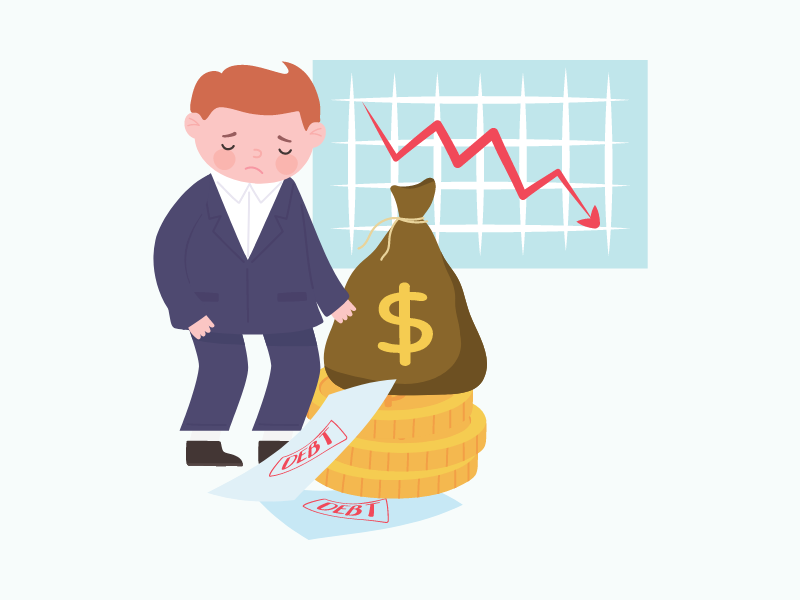Should I Be Investing or Paying off My Debt?

One question I have gotten lately is whether someone should invest their extra cash or use it to pay off their debt.
This question used to be a lot more straightforward, but because of the rising interest rates we have been seeing lately, the answer would be unique to each situation.
If you find yourself in this situation, would you rather take advantage of the current recession and buy investments while everything is on sale? Or would you pay down some of the debt you have accumulated?
Of course, there is good debt and bad debt, but for someone starting off their financial journey, you should assume all debt is bad for now.
I personally know a few people who have extra cash hanging out in their savings accounts, and they are reluctant to pay off their debt because the money gives them a sense of financial stability.
Today we are going to talk about why doing that is hurting your financial future, when you should pay down debt, and when it is best to put your money in investments.
Quick Guidelines
- If your debt’s interest rate is higher than 8% (the average stock market return), then you should focus on paying it off before investing.
- Before you pay off any debt or start investing, make sure you set up an emergency fund first (3-6 months of your monthly expenses).
- Make sure to always contribute enough to your employer’s retirement plan to receive the company match.
- Always pay the minimum on all your debts.
1. Credit Card Debt

When it comes to paying off your debt, one might feel reluctant because we, as a society, have grown too comfortable with carrying debt.
If you are in a position where you have credit card debt, then know that you are in a very bad spot. Credit card debt is the worst debt to have because interest rates are usually as high as 20%.
You are going to want to get rid of any credit card debt or loans you may have before getting started with investing.
2. Student Loans

Next up is student loans. This is a tricky one, but again, it depends on your interest rate. The average interest rate on student loans is 3.5-5%.
If you were to invest your money in stock market index funds, you can expect to get an average return of 8%. Roughly, you will be ahead by 3% if the stock market is doing well.
However, after taxes, the difference between your student loan interest and your investment gains can be minuscule. This is why this situation is more of a behavioral or psychological matter.
If you do not like the idea of having any type of debt, then by all means go ahead and pay off your student loans (payments are currently on hold because of COVID, so take advantage of that while it lasts).
On the other hand, if you are psychologically fine with having debt and are responsible with your payments, then by all means you can start investing since you are getting a higher return.
3. Mortgage Loan

Let’s say that you have a mortgage loan of around 4.5%. Assuming that you have a 30-year mortgage of $500,000, which makes your mortgage payment roughly $2500 per month without any taxes and fees.
If you have an extra $1000 per month, should you put it towards paying off your mortgage or investing it in the stock market?
If you put the extra $1000 towards your mortgage, you would be paying off your mortgage in a total of 17 years instead of 30 years. This would equate to roughly $198,000 in savings.
On the other hand, if you were to invest that extra $1000 in the stock market with an average return of 8%, you would have roughly $1.36 million.
However, this situation is also a behavioral/psychological matter. Some people feel more comfortable owning their home. They want to feel like they actually own it and not the bank.
If that is you, then definitely prioritize paying off your home faster.
4. Investing

Now that we have covered the reasons for paying down debt, let's review when you should be investing your money.
Let me start off by saying that investing is very volatile. This means that if you do not have a risk tolerance, you are going to struggle to see your money go up and down in the market.
In order to work on this, I always recommend that you adopt a passive investing strategy. This entails you becoming a long-term investor who is not concerned with what the market will do tomorrow.
To make this even more passive, I recommend that you stick to buying index funds that have an average return of 7–10%. This can be put on autopilot by automating your money to directly go to your investment accounts at the beginning of every month.
The types of accounts I recommend are as follows:
- 401K
- Roth IRA
- HSA
- Taxable Brokerage Accounts
5. How I Handle Debt

I personally do not like to be in debt.
I have always been responsible with my credit cards and use them to build good credit. This is why I always pay off my balance at the end of each month.
When I graduated from college, I had $37K in student loans that I needed to pay back. $17K were parent plus loans that I took out in my dad’s name. I immediately started to pay them off as I started working and finished them in about 6 months or so.
The other $20K was in my name at an average of 3.5% interest. In the beginning, I was making double the minimum payment so that I could pay them quicker. The rest of my cash was invested in the stock market.
However, in March 2020, I stopped making payments when the interest was halted on student loans. At that point, I was using all my extra cash to invest in the stock market, real estate, and crypto.
I still had a balance of roughly $10K. I was hoping that I would be forgiven for these loans, but I lost that hope. This is why I used some extra cash I had to completely pay off my entire student loan balance earlier this year.
Now I’m debt-free!
Conclusion
Choosing whether to pay off debt or invest extra cash is a conundrum that we all face at some point.
In order to make the most of your money, make sure you are always paying the minimums on your debt; save some money for emergencies; get rid of high-interest debt like credit cards; and contribute to your retirement accounts.
Saving money in your checking or savings account is not doing you any good. The only benefit is that it makes you feel safe in the short term. But, in reality, it is hindering your financial growth.
Have a great week!
Muhamed
📖 Quote of the Week
There are no shortcuts when it comes to getting out of debt - Dave Ramsey

